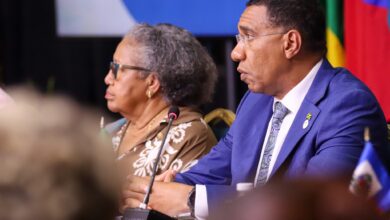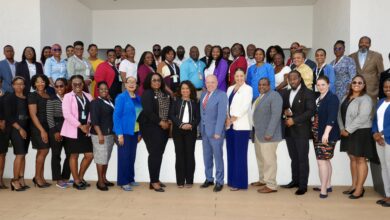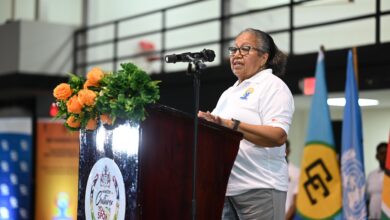
The migration of healthcare workers from CARICOM, the implementation of the regional cooperation in health framework, and preparations for the International Cricket Council (ICC) Men’s T20 World Cup were among the issues that occupied the attention of Chief Medical Officers (CMOs) in Saint Lucia from 23-24 April.
CMOs from CARICOM Member States met at the Royalton, Saint Lucia, for their Thirty-Second Meeting, ahead of the Caribbean Public Health Agency’s (CARPHA) 68th Regional Research Conference at the same venue.
Chief Medical Officer (Ag.) of Dominica, Dr. Lynora Fevrier Drigo chaired the meeting which also looked at CARICOM’s positions on an international Pandemic Accord, non-communicable diseases, disease surveillance, and pandemic preparedness.
In her opening remarks, Dr. Drigo underscored the value of CMOs’ insights on those issues. She noted that the meeting presented a unique opportunity for them to strengthen their commitment to improving the health outcomes of CARICOM citizens through innovative and effective solutions to the problems the sector faces.

Director for Human and Social Development at the CARICOM Secretariat, Helen Royer underscored the importance of the CMOs in advancing policies designed to meet the health needs of the Community.
Noting that the regional health agenda requires collaboration, she lauded the commitment of the CMOs, CARPHA, the Pan American Health Organisation (PAHO), and other partners who work to implement all areas of health.
“Your expertise and commitment continue to shape and enhance the future of health across the Region,” Ms Royer stated.

The Caribbean Cooperation in Health (CCH-IV) framework was prioritised in the discussion. The participants heard that the COVID-19 pandemic and limited resources hampered the implementation of the framework. However, progress was recorded in several areas including a legislative framework for health, a regulatory system for essential medicines, and common training programmes for health professionals. CARICOM Chief Medical Officers agreed on a comprehensive review of CCH-IV so that the lessons learned could strengthen the successor framework for regional cooperation in health.
CCH-IV was built on five strategic priorities including universal access to health and universal health coverage; data and evidence for decision-making; partnership and resource mobilisation for health; and mechanisms for the health and wellbeing of Caribbean people throughout their life course.
As the Region grapples with the migration of healthcare workers, the CMOs provided feedback on a draft Policy Brief to address the drain of this critical human resource from the Caribbean.
The Policy Brief, which was informed by a study commissioned by PAHO, offers recommendations for Member States to improve conditions to maintain capacity in the healthcare workforce.
CARICOM Chief Medical Officers noted the value of the insights drawn from the study, particularly the push and pull factors that influence healthcare workers to leave the Caribbean. At the same time, they emphasised the need for further research on the factors that influence healthcare workers to stay, so that those can be leveraged to keep healthcare workers at home.
Other efforts in train to mitigate the impact of migration on the health sector were also in focus at the meeting. These include CARPHA’s initiative to enhance capacity in the public health workforce and the WHO’s Catalytic Fund to strengthen countries’ capacity to offer the full range of essential health services.

Preparations for the ICC Men’s T20 World Cup 2024 in June 2024, and the work of the regional Health, Safety, and Security Sub-committee were central to the meeting’s discussions.
The sub-committee, chaired by CARPHA, includes the Caribbean Disaster Emergency Management Agency (CDEMA), the CARICOM Secretariat, the Regional Security System (RSS), and the CARICOM Implementation Agency for Crime and Security (CARICOM IMPACs). It has been coordinating all aspects of health, safety, and security for hosting the games in the Caribbean.
CARICOM Chief Medical Officers lauded CARPHA for supporting the ICC T20 World Cup host countries to strengthen their communicable disease surveillance and readiness to respond to potential health threats through health security assessments and simulation exercises.
The ICC T20 World Cup matches coming up in June, will be played in Antigua and Barbuda, Barbados, Guyana, Saint Lucia, Saint Vincent and the Grenadines, and Trinidad and Tobago.
CARICOM’s position on the international Pandemic Accord also received the attention of the Chief Medical Officers, as negotiations evolved rapidly for an agreement among the 194 member states of the World Health Organisation to deal with future pandemics.
The Accord is intended to address the weaknesses in the capacities of developing countries and the lack of international cooperation that occurred during the global response to COVID-19.
CMOs agreed to advance the Community’s positions on the negotiating text, ahead of the adoption of the Accord at the World Health Assembly scheduled for 27 May – 1 June.
As the Caribbean seeks to build its resilience against future pandemics, the meeting was apprised of CARPHA’s effort to strengthen Member States’ capacities through a Pandemic Fund. CARPHA is expected to support health emergency surveillance, early warning systems, laboratory systems, and workforce capacity in the Region.

On the issue of non-communicable diseases, CMOs were urged to continue measures for prevention and control and to take note of preparation for the Fourth United Nations NCDs Summit in 2025.
The meeting recalled that CARICOM brought global attention to the burden of NCDs on public health at the first Heads of Government Conference on NCDs in 2007. That Summit ended with the landmark Declaration of Port-Of-Spain: Uniting to Stop the Epidemic of Chronic NCDs, which continues to guide efforts to tackle chronic diseases such as heart disease, hypertension, diabetes, and cancer.
One such effort is the CARPHA-led Caribbean Moves initiative, supported by a Caribbean Development Bank (CDB) Grant Agreement to address NCDs through broad-based public-private actions.
On the issue of vector-borne disease surveillance, the Meeting heard that CARICOM Member States have strong entomology and vector-control capacities, and CARPHA is supporting the expansion of those capacities.
This is being done through several mechanisms including the Caribbean Vector-borne Disease Network (CariVecNet) which is leveraging expertise within the region and building capacity in places that need support.
The Network met in a three-day session on vector-borne outbreak preparedness and response, on the sidelines of the CMOs’ meeting and CARPHA Research Conference.
CMOs benefited from a presentation by PAHO which revealed that rates of routine childhood vaccination coverage continue to show positive trends upward, indicating a reversal of the alarming rates of decline that the COVID-19 pandemic exacerbated.
However, CMOs were urged to ramp up surveillance and notification targets for rash and fever cases that could indicate imported vaccine-preventable diseases such as measles, rubella, and polio.
At the meeting, the CMOs received an update on the humanitarian and health situation in Haiti. They expressed solidarity with Haiti and agreed to support its efforts to bring regional and international attention to the humanitarian and health crisis facing the country.






